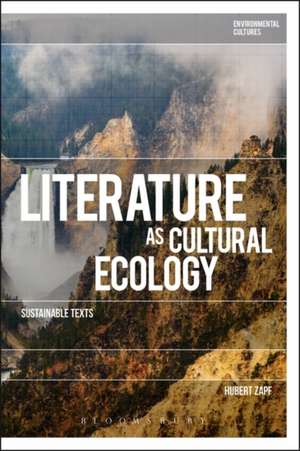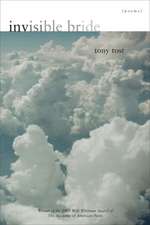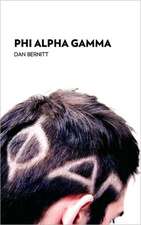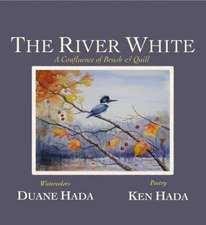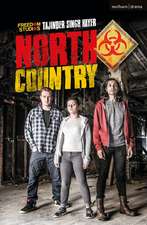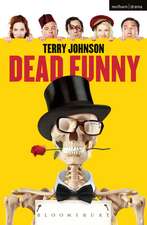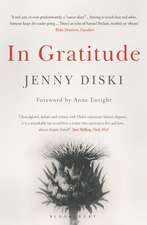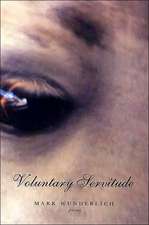Literature as Cultural Ecology: Sustainable Texts: Environmental Cultures
Autor Professor Hubert Zapfen Limba Engleză Paperback – 18 oct 2017
| Toate formatele și edițiile | Preț | Express |
|---|---|---|
| Paperback (1) | 239.32 lei 6-8 săpt. | |
| Bloomsbury Publishing – 18 oct 2017 | 239.32 lei 6-8 săpt. | |
| Hardback (1) | 775.43 lei 6-8 săpt. | |
| Bloomsbury Publishing – 20 apr 2016 | 775.43 lei 6-8 săpt. |
Din seria Environmental Cultures
- 23%
 Preț: 197.05 lei
Preț: 197.05 lei - 23%
 Preț: 191.13 lei
Preț: 191.13 lei - 23%
 Preț: 197.34 lei
Preț: 197.34 lei - 30%
 Preț: 508.70 lei
Preț: 508.70 lei - 22%
 Preț: 230.79 lei
Preț: 230.79 lei - 24%
 Preț: 196.36 lei
Preț: 196.36 lei - 7%
 Preț: 142.65 lei
Preț: 142.65 lei - 22%
 Preț: 128.11 lei
Preț: 128.11 lei - 30%
 Preț: 509.76 lei
Preț: 509.76 lei - 23%
 Preț: 190.68 lei
Preț: 190.68 lei - 30%
 Preț: 567.25 lei
Preț: 567.25 lei - 30%
 Preț: 569.06 lei
Preț: 569.06 lei - 22%
 Preț: 237.28 lei
Preț: 237.28 lei - 13%
 Preț: 230.03 lei
Preț: 230.03 lei - 23%
 Preț: 198.12 lei
Preț: 198.12 lei - 13%
 Preț: 229.24 lei
Preț: 229.24 lei - 23%
 Preț: 197.77 lei
Preț: 197.77 lei - 23%
 Preț: 198.05 lei
Preț: 198.05 lei - 24%
 Preț: 196.08 lei
Preț: 196.08 lei - 23%
 Preț: 198.82 lei
Preț: 198.82 lei - 30%
 Preț: 540.07 lei
Preț: 540.07 lei - 13%
 Preț: 238.58 lei
Preț: 238.58 lei - 30%
 Preț: 509.93 lei
Preț: 509.93 lei - 22%
 Preț: 225.59 lei
Preț: 225.59 lei - 23%
 Preț: 221.63 lei
Preț: 221.63 lei - 30%
 Preț: 773.81 lei
Preț: 773.81 lei - 22%
 Preț: 226.42 lei
Preț: 226.42 lei - 30%
 Preț: 509.93 lei
Preț: 509.93 lei - 22%
 Preț: 230.24 lei
Preț: 230.24 lei - 23%
 Preț: 255.76 lei
Preț: 255.76 lei - 22%
 Preț: 237.28 lei
Preț: 237.28 lei
Preț: 239.32 lei
Preț vechi: 273.60 lei
-13% Nou
Puncte Express: 359
Preț estimativ în valută:
45.79€ • 47.72$ • 37.92£
45.79€ • 47.72$ • 37.92£
Carte tipărită la comandă
Livrare economică 03-17 aprilie
Preluare comenzi: 021 569.72.76
Specificații
ISBN-13: 9781350051966
ISBN-10: 1350051969
Pagini: 312
Dimensiuni: 234 x 156 x 23 mm
Greutate: 0.44 kg
Ediția:NIPPOD
Editura: Bloomsbury Publishing
Colecția Bloomsbury Academic
Seria Environmental Cultures
Locul publicării:London, United Kingdom
ISBN-10: 1350051969
Pagini: 312
Dimensiuni: 234 x 156 x 23 mm
Greutate: 0.44 kg
Ediția:NIPPOD
Editura: Bloomsbury Publishing
Colecția Bloomsbury Academic
Seria Environmental Cultures
Locul publicării:London, United Kingdom
Caracteristici
Includes new readings of works by such writers as Emily Dickinson, Herman Melville, William Faulkner, Toni Morrison and Edgar Allen Poe
Notă biografică
Hubert Zapf is Professor and Chair of American Literature at the University of Augsburg, Germany. His recent books include, as co-editor, American Studies Today: New Research Agendas (2014) and English and American Studies: Theory and Practice (2012).
Cuprins
Part I: Cultural Ecology and Literary Studies1. Introduction2. The Ecocultural Potential of Literature3. Sustainability and Literature4. Literature as an Ecological Force in Poems by Emily Dickinson, Linda Hogan, and A.R. AmmonsPart II: Ecocriticism and Cultural Ecology5. Ecocriticism in the 20th Century: The Return of Nature to Writing About Culture6. Ecocriticism in the 21st Century: The Return of Culture to Writing About Nature7. Politicized Ecocriticism: From Nature-Worship to Civilizational Critique8. Ecological Thought and Critical Theory: From Antagonism to AlliancePart III: Literature As Cultural Ecology9. From Natural Ecology to Cultural Ecology10. Cultural Ecology and Material Ecocriticism11. Literature As Cultural Ecology12. Triadic Functional Models of Literature as Cultural Ecology: Hawthorne's The Scarlet Letter, Melville's Moby Dick, Chopin's The Awakening, Faulkener's The Sound and The Fury, Morrison's Beloved.Part IV: Transdisciplinary Contexts of a Cultural Ecology of Literature13. Text and Life14. Order and Chaos15. Connecting Patterns and Creative Energies16. Matter and Mind17. Solid and Fluid18. Wound and Voice19. Absence and Presence20. Local and GlobalBibliographyIndex
Recenzii
Zapf's theoretical argumentation and analytical insights outlined in the four Parts of this rich book undoubtedly bespeak the scholar's erudition. Zapf is very careful to make his point clear to the reader thanks to abundant philosophical documentation ... Zapf's in-depth discussions never fail to provide inspiration for new comparative or transdisciplinary methods of literary analysis. All in all, then, this monograph will certainly become an indispensable tool for scholars wishing to undertake further research in this promising field of enquiry.
Zapf (Univ. of Augsburg, Germany) brings a global perspective to ecocritical discourse by applying tenets of cultural ecology to a diverse selection of literary works. . Combining the arts and the social and natural sciences, this new and imaginative approach covers fresh ground. --L. L. Johnson, Lewis & Clark College. Summing Up: Highly recommended.
Zapf's is, in short, a bold and important contribution to the ecocritical debate, framed with admirable clarity.
Hubert Zapf delivers a take on literature that includes existing literary theory on ecology and ecocriticism and takes it to a new level of ecological thought.
Magisterial and sweeping, this book offers the first synthesis of major trends in ecocriticism from a European perspective. It integrates transdisciplinary approaches from German philosophy to contemporary Continental and Anglo-American theory, biosemiotics, and global policy studies. All these considerations are marshaled to support a compelling case for the transformative cultural agency and aesthetic force of literature as an ecological dimension of discourse that metonymically extends to all forms of life on earth. Literature as Cultural Ecology is necessary reading for anyone interested in environmental humanities.
In Literature as Cultural Ecology, Hubert Zapf brings his vast knowledge of world literature and literary theory to bear on many of the central concerns of environmental textual studies. This book not only reveals the intersections between "cultural ecology" and "ecocriticism," but it profoundly and accessibly reinforces the significance of literature on a changing, wounded, beautiful planet.
Hubert Zapf's study of literature as cultural ecology is a highly original recognition of and investigation into the great potential of literary texts in past and present to address ecological and economic issues. It releases literature from its narrow philological definition and places it in the context of current concerns of environmental humanities. Zapf's ingenious and impressive reading of European and North American literature reveals its power as an ecological force and as a source of sustainability. The transdisciplinary method and transnational dimension of his original research chart the way for its reception in the current discussions of ecocriticism at a propitious moment when global awareness and interaction for the sake of the preservation of the environment are vitally needed.
This is a wonderful book. It is written in the spirit of ecology of mind pursued by Gregory Bateson, and also deploys the wider semiotic of living knowing associated with the American philosopher C.S. Peirce. Every page is alive with a mind that has grasped that the semiotics of nature and of culture are very intimately interconnected. Here is sanity. Here is intellectual creativity. Read it.
Zapf (Univ. of Augsburg, Germany) brings a global perspective to ecocritical discourse by applying tenets of cultural ecology to a diverse selection of literary works. . Combining the arts and the social and natural sciences, this new and imaginative approach covers fresh ground. --L. L. Johnson, Lewis & Clark College. Summing Up: Highly recommended.
Zapf's is, in short, a bold and important contribution to the ecocritical debate, framed with admirable clarity.
Hubert Zapf delivers a take on literature that includes existing literary theory on ecology and ecocriticism and takes it to a new level of ecological thought.
Magisterial and sweeping, this book offers the first synthesis of major trends in ecocriticism from a European perspective. It integrates transdisciplinary approaches from German philosophy to contemporary Continental and Anglo-American theory, biosemiotics, and global policy studies. All these considerations are marshaled to support a compelling case for the transformative cultural agency and aesthetic force of literature as an ecological dimension of discourse that metonymically extends to all forms of life on earth. Literature as Cultural Ecology is necessary reading for anyone interested in environmental humanities.
In Literature as Cultural Ecology, Hubert Zapf brings his vast knowledge of world literature and literary theory to bear on many of the central concerns of environmental textual studies. This book not only reveals the intersections between "cultural ecology" and "ecocriticism," but it profoundly and accessibly reinforces the significance of literature on a changing, wounded, beautiful planet.
Hubert Zapf's study of literature as cultural ecology is a highly original recognition of and investigation into the great potential of literary texts in past and present to address ecological and economic issues. It releases literature from its narrow philological definition and places it in the context of current concerns of environmental humanities. Zapf's ingenious and impressive reading of European and North American literature reveals its power as an ecological force and as a source of sustainability. The transdisciplinary method and transnational dimension of his original research chart the way for its reception in the current discussions of ecocriticism at a propitious moment when global awareness and interaction for the sake of the preservation of the environment are vitally needed.
This is a wonderful book. It is written in the spirit of ecology of mind pursued by Gregory Bateson, and also deploys the wider semiotic of living knowing associated with the American philosopher C.S. Peirce. Every page is alive with a mind that has grasped that the semiotics of nature and of culture are very intimately interconnected. Here is sanity. Here is intellectual creativity. Read it.
